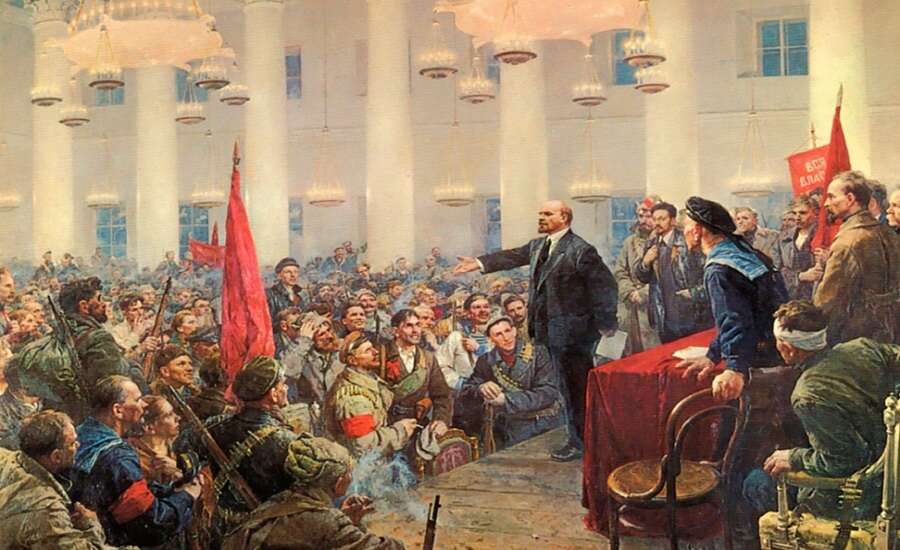
Painting by V.Serov
St. Petersburg changes his name. War difficulties and February revolution. The Bolsheviks seize the power in Petrograd and all over the country. The city during the Civil War. Transportation of the capital to Moscow. First years of New Economic Policy.
In August 1914, it was decided to change the name of the Russian capital from St.Petersburg to Petrograd since the old name sounded too German for Russians in the conditions of World War I. It was renamed not in a sense (it stayed the city of Peter) but in form and became Petrograd that sounded good in Russian.
The city's industry began to work for support of the war effort and a lot of city buildings, including a large portion of the Winter Palace, were turned into hospitals (in the hospital of the Winter Palace there worked the whole family of Nikolai II including children).
The war did not go too well for Russia. The government had discredited itself, the cases of public funds embezzlement became known and political tensions started rising. The food supply of the Russian capital were permanently delayed. The supply of the city with 2 mln people depended on the railway network overloaded with war transport or distroyed. That was not only dangerous for the health of the population but also to some parts of it by the end of 1916. Petrograd stepped into the New Year with its inhabitants infuriated by the long lines in front of food shops.
The combination of social unrest and the people's grievances brought about the social revolt wave. At the time of the revolution the tsar was in Mogilev at the army's headquarters and his family in Tsarskoje Selo. The tzar abdicated and the power passed to the Provisional Government headed by Kirensky.
The political and economic crisis continued all through 1917 and in the fall the Bolshevik party led by Vladimir Lenin had captured political power. On October 25 (November 7), 1917 the blank shot of the cruiser "Aurora" gave workers and soldiers the signal to storm the Winter Palace, the residence of the government. Instead of assault a group of the temporary revolution committee arrested the members of the Provisional Government.
Except the arrest of the government the troops of the Bolshevik Revolution committee occupied posts, telegraphs, railway stations. Most of the ministers were arrested and a long period of building the socialism (73 years) began. The Bolshevik government did everything to strengthen its power. In January 1918 the Constituent Assembly was disbanded. The Bolsheviks declared peace with Germany but lost Ukranian territorries. The Red terror was everywhere and a Civil War began (1918 - 1921).
The working troops and soldiers were transformed into Red Guards and became the core of the Red Army. When men good for military service were mobilized to Civil War fronts, the large part of population migrated to the rural area to find some food. The population divided into 2 basic parts: those who were with Bolsheviks ("red") and against them ("white"). The tzar's army generals Kornilov, Krasnov, Kaledin gathered troops from the officers and cadets to fight against the Bolsheviks. The quantity of Petrograd population reduced from 2 mln in 1917 to 7 hundred people in 1920
By the beginning of 1918 the German troops were so close to Petrograd that the Bolshevik government of Vladimir Lenin decided to move the capital to Moscow, which was still far from the front. Hence Petrograd was left to be just a regional center. Further change occurred when many of the street names were altered according to the revolutionary fashion of the day. Palace Square was renamed the Uritsky Square after an assassinated Bolshevik politician and Nevsky Prospect became the 25th of October Prospect after the October Revolution. A number of Revolutionary monuments were erected, but most of them were made of the cheapest materials and did not last long.
After the end of the Civil War the city of Petrograd started a recovery under the New Economic Policy (NEP), proclaimed by the Bolsheviks, allowing some elements of the market economy. In 1924 the name of the city was changed to Leningrad, and that was a symbol of its transition to a Socialist city.
Join us on Facebook
We invite you to become a fan of our company on Facebook and read Russian news and travel stories. To become a fan, click here.
Join our own Russian Travel, Culture and Literature Club on Facebook. The club was created to be a place for everyone with an interest in Russia to get to know each other and share experiences, stories, pictures and advice. To join our club, please follow this link.